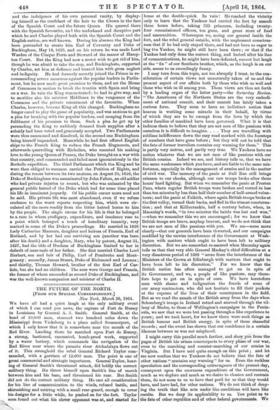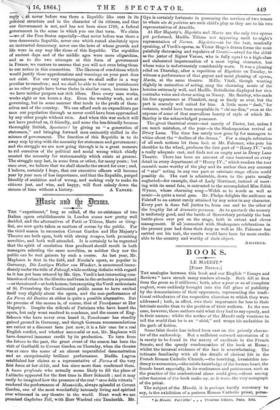THE FUTURE OF THE NORTH.
FROM OUR SPECIAL CORRESPONDENT.]
New York, March 26, 1864. WE have all had a quiet laugh at the only military event of which I can send you news, the capture of Fort de Russey in Louisiana by General A. J. Smith. General Smith, at the head of 10,000 men, steamed two hundred miles down the Mississippi from Vicksburg to a place called Summerport, of which I only know that it is somewhere near the mouth of the Red River. Landing there he marched upon Fort de Russey, a strong, bastioned, casemated, bomb-proof work, supported by a water battery, which commands the navigation of the Red River near where the parasite river Atchafalaya flows out of it. This stronghold the rebel General Richard Taylor com- manded, with a garrison of 12,000 men. The point is one of great commercial and strategic importance. General Taylor, hear- ing of General Smith's threatened attack, did boldly the correct military thing. He threw himself upon Smith's line of march between him and his base, and threatened his rear. But Smith did not do the correct military thing. He cast all consideration for his line of communication to the winds, refused battle, and skirmishing and retiring with a small rear-guard, enough to cover his designs for a little while, he pushed on for the fort. Taylor soon found out what his clever opponent was at, and started for home at the double-quick. In vain ! He reached the vicinity only to learn that the Yankees had carried the fort by assault three hours before, taking 325 prisoners, including twenty- four commissioned officers, ten guns, and great store of food and ammunition. Whereupon we, seeing our general inside the fort, and the rebel general outside, with the unpleasant conscious- ness that if he had only stayed there, and had not been so eager to bag the Yankee, he might still have been there ; or that if the Yankee had only done the correct thing, and looked after his line of communications, he might have been defeated, cannot but laugh at the " fix " of our Southern brother, which, as the laugh is on our side, seems to us exceedingly funny.
I may turn from this topic, not too abruptly I trust, to the con- sideration of certain views not unnaturally taken of us and the present aspect of our affairs both by those who wish us well and those who wish us ill among you. Those views are thus set forth by a leading organ of the latter party—the Saturday Review. " The Americans of the Northern States are the very embodi- ment of national conceit, and their conceit has lately taken a curious form. They seem to have an indistinct notion that heaven is working some miracle in their behalf, by virtue of which they are to be exempt from the laws by which the other families of mankind have been governed. What it is that induces them to believe that they are not men of like passions with ourselves it is difficult to imagine. . . . They are travelling with sublime indifference down the easy road marked with the footsteps of numbers that have gone before ; but they will not be told that the fate of former travellers contains any warning for them." This is partly very untrue, and partly very true. We Yankees have no notion whatever that we are not men of like passions with our British cousins. Indeed we see, and history tells us, that we have the same weaknesses which you have, and are liable to the same mis- fortunes, especially in the management of armies and in the matter of civil war. The !memory of the panic at Bull Run still brings crimson to our cheeks, although our raw troops broke after three hours' hard fighting. But when we remember the panic at Preston Pans, where regular British troops were broken and routed in less than ten minutes by less than half their number of half-armed volun teers ; and the panic at Falkirk, where again British troops broke at the first volley, turned their backs, and fled in the utmost consterna- tion ; and that at Killiecrankie, half a century before, when, in Macaulay's words, "in two minutes the battle was lost and won," —when we remember this we are encouraged ; for we know that British troops are brave, mayhap bravest, and we do not think that we are not men of like passions with you. We see—none more clearly—that our generals have been thwarted, and our campaigns muddled by the unwise interference of the Government at Wash- ington with matters which ought to have been left to military discretion. But we are somewhat re-assured when Macaulay again tells us that that very able General Mackay's chief difficulties at a very disastrous period of 1689 "arose from the interference of the Ministers of the Crown at Edinburgh with matters that ought to have been left to his discretion." For we know that the British nation has often managed to get on in spite of its Government, and we, a people of like passions, may there- fore hope to get on in spite of ours. We have heretofore seen with shame and indignation the frauds of some of our army contractors, who did not hesitate to fill their pockets at the expense of the lives of their countrymen in the field. But as we read the annals of the British army from the days when Schomberg's troops in Ireland rotted and starved through the vil- lany of Shales, to those of Wellington's campaigns in the Penin- sula, we saw that we were but passing through a like experience to yours; and we took heart, for we knew there were such things as British honour and British energy, in spite of those shameful records ; and the event has shown that our confidence in a certain likeness between us was not misplaced.
I might carry this parallel much farther, and show you from the pages of British his orians counterparts to every phase of our war, even to the marching and counter-marching of our armies in Virginia. But I have said quite enough on this point ; and let me now confess that we Yankees do not believe that the fate of
other nations 4' contains any warning " for us. Even the reckless speculation and the corresponding extravagance of the present day,
consequent upon the enormous expenditure of the Government, much as we deplore and much as we desire to chasten and restrain them, do not seem to us to have that peril for us that they would have, and have had, for other nations. We do not think of deny- ing the truth that like acts under like conditions will have like results. But we deny its applicability to us. You point us to the fate of other republics and of other federal governments. We reply t never before was there a Republic like ours in its
political structure and in the character of its citizens, and that our Government is not, and has not been since 1789, a federal government in the sense in which you use that term. We claim —we of the Free States especially—that never before was there a true democratic Republic, never one which rested absolutely upon an instructed democracy, never one the laws of whose growth and life were in any way like those of this Republic. The republics of ancient days and of the middle ages were mere oligarchies, and as to the two attempts at this form of government in France, we venture to assume that you will not even bring those to our notice in this connection. The likeness of conditions which would justify these apprehensions and warnings on your part does not exist. For our very extravagance we shall suffer in a way peculiar to ourselves ; and we shall be able to bear our punishment as no other people have borne theirs in similar cases, because here we have neither paupers nor rich idlers. Here every man works, works eight or ten hours a day. Even the wealthy work, not at governing, but in some manner that tends to the profit of them- selves and of the country. We can afford such an expenditure per man our population through as never could have been approached by any other people without ruin. And when this war ends it will not have profited us, 0 friendly, and none the less friendly because thoroughly British, Spectator! by giving us " a generation of statesmen," and bringing forward men eminently skilled in the science of government. The function of this Republic is to do away step by step with the necessity for statesmen and government; and the struggle we are now going through is in a great measure to rid ourselves of the political and social wrong which chiefly created the necessity for statesmanship which exists at present. The struggle may last, in some form or other, for many years ; but once over, we believe that we shall sheathe the sword for ever ; and, I believe, certainly I hope, that our executive officers will become year by year men of less importance, and that the Republic, purged bloodily of ambition and of wrong, and seeking only to make its citizens just, and wise, and happy, will float calmly down the































 Previous page
Previous page